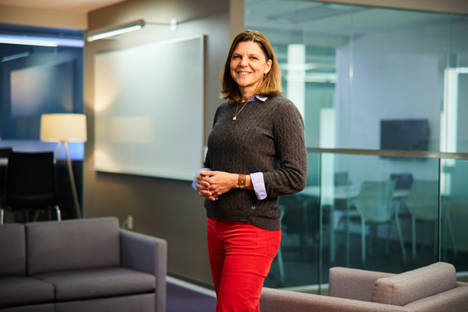SAN FRANCISCO (Jan. 10, 2024) – The UCSF Department of Orthoapedic Surgery is delighted to announce that Tamara Alliston, PhD, a Professor of Orthopaedic Surgery, has been honored with the prestigious 2024 Orthopaedic Research Society (ORS) Outstanding Achievement in Mentoring Award. This accolade celebrates Dr. Alliston's steadfast commitment to mentoring and fostering the success of emerging investigators dedicated to advancing orthopaedic research.
“Dr. Alliston is exceptional in nurturing the next generation of orthopaedic researchers,” said Dr. C. Benjamin Ma, Chair of the Department. “She encourages innovation, collaboration, and excellence in orthopaedic research, and she instills a sense of curiosity and a commitment to pushing the boundaries of orthopaedic science. The Department is very proud of her.”
The ORS Outstanding Achievement in Mentoring Award was created in 2014 to celebrate the commitment of the outstanding mentors who promote the success of new investigators in the pursuit of independent orthopaedic research careers.
“This award recognizes Dr. Alliston's vital role in shaping the future of orthopaedic research. Her influence reaches far and wide, and her legacy as a mentor will undoubtedly continue to inspire generations of researchers,” Dr. Ma added.
About Tamara Alliston, PhD
Tamara N. Alliston, PhD, is a Professor in the UCSF Department of Orthopaedic Surgery. She directs the UCSF Musculoskeletal Center and the National Institutes of Health (NIH) P30-supported UCSF Core Center for Musculoskeletal Biology and Medicine. With a focus on TGFβ signaling, her laboratory investigates the interaction between physical and biochemical signals in the control of skeletal cell differentiation and the role of these pathways in skeletal development and disease. Supported by the NIH, U.S. National Science Foundation (NSF), and the U.S. Department of Defense (DOD), her group employs approaches from molecular and cell biology, materials science, and engineering to identify mechanisms of skeletal disease to advance the development of new therapeutic strategies.
Dr. Alliston pursued her undergraduate education in Biology at Trinity University in San Antonio, Texas. She earned her doctoral degree in Cell Biology from Baylor College of Medicine in Houston, Texas in 1998, mentored by Dr. JoAnne Richards. After receiving her doctorate, Dr. Alliston was named an Arthritis Foundation Fellow and worked as a post-doctoral scientist mentored by Dr. Rik Derynck at UCSF. In 2002, she was appointed Assistant Adjunct Professor in the Department of Cell and Tissue Biology at UCSF, and in 2006, she started her laboratory in the UCSF Department of Orthopaedic Surgery.
Dr. Alliston is a faculty member in the UC Berkeley/UCSF Graduate Program in Bioengineering and the UCSF Graduate Programs in Biomedical Sciences, Oral and Craniofacial Sciences, and Developmental and Stem Cell Biology. She is also affiliated with the UCSF HIVE: Health Innovations via Engineering, the Program in Craniofacial Biology, and the Eli and Edythe Broad Center for Regenerative Medicine and Stem Cell Research.
Dr. Alliston serves widely as a reviewer for journals and funding agencies, including for the DOD and the NIH. She is also an Editorial Board Member at the Journal of Bone and Mineral Research. She chaired the AAOS/ORS Workshop on Joint Crosstalk and the 2022 Gordon Research Conference on Musculoskeletal Biology and Bioengineering. She currently serves as a Counselor for the American Society for Bone and Mineral Research.
Dr. Alliston is a Fellow of the American Institute for Medical and Biological Engineering (AIMBE). Dr. Alliston's honors include a Hulda Irene Duggan Arthritis Investigator Award, the ASBMR Harold M. Frost Young Investigator Award, the AIMM-ASBMR John Haddad Young Investigator Award, the ORS Women’s Leadership Award, and the ASBMR Adele Boskey Esteemed Award.
Dr. Alliston’s other service and leadership efforts focus on the development of the next generation of scientists and leaders.
###
